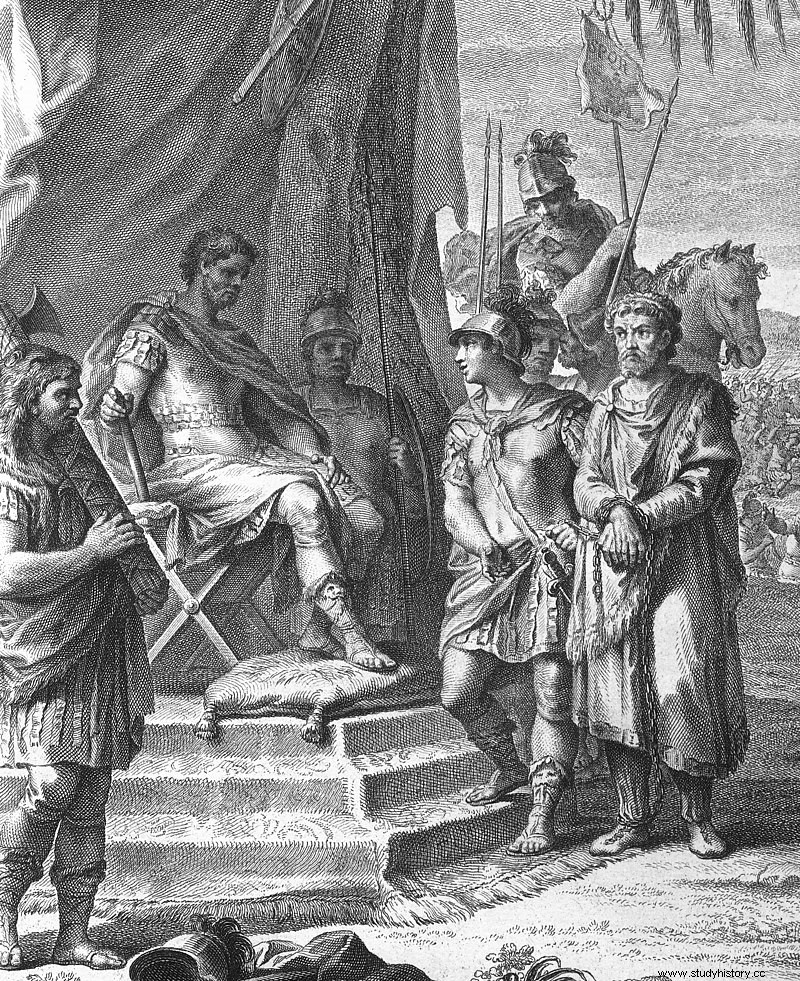
The Jugurthine War is a war between the Kingdom of Numidia and the Roman Republic in North Africa.
Speaking of Numidia, it is also known as the kingdom of the horse race, and it was a force that divided the victory and defeat of the Second Punic War.
Hannibal, who crossed the Alps with the Numidian cavalry, overwhelmed the Roman army, and Scipio, who teamed up with King Masinissa of Numidia, defeated Hannibal.
Since then, Numidia has been an ally of Rome, but why did this happen?
Ambitious King of Numidia Jugurtha
Jugurtha is the name of King Numidia at the time.
In 149 BC, Scipio's ally Masinissa died at the age of 89. He has a ridiculously long life considering the medical system at that time.
After Masinissa's death, he was ruled by three kings. This does not mean that the territory was divided into three equal parts, which is rare in the history of the world, but it seems that the administrative authority was divided into three.
The throne itself will be held by his eldest son, Michipsa, and the military power will be held by his second son, Gulussa, and then by his third son, Master Naval. The alliance with Rome continued through Scipio Aemilianus (hereinafter referred to as "Scipio Aemilianus"), which succeeded Scipio Aemilianus, and Numidia grew into the number one power in North Africa.
Jugurtha was the concubinage of his third son, Master Nabal. He seems to have been pretty good at it, and he seems to have participated in the Roman army under the command of Small Scipio at the order of King Numidia. He seemed to be very active, and Scipio Aemilian even wrote a letter to King Numidia.
That's why King Numidia Michipsa adopts Jugurtha.
Fourteen years later, Jugurtha's ambitions run wild.
The background may be the downfall of the Scipio family.
Small Scipio died without children, Scipio Nashika fled the country in the aftermath of crushing the reforms of the Gracchi brothers, and the Gracchi brothers, the grandson of Scipio Africanus, were killed by the Senate.
The Scipio clan and the Numidian royal family were Roman patrones and creativity, so from the Jugurtha side, it may not have been necessary to justify Rome without the Scipio family.
It wouldn't be too strange to give up on Rome, which openly kills two young people who have embarked on reforms worried about the weakening of the country. In fact, at about the same time, there were many rebellions against Rome, such as the Social War, the Mitridates rebellion, and the Sicilian slave rebellion.
In 118 BC, King Numidia Michipsa died from the world. He asked the Roman Senate for guardianship and seemed to think of a condominium between Jugurtha and his two sons, but Jugurtha fought and won with his two successors.
One of Michipsa's illegitimate children was killed, and the survivors fled to Rome.
The Roman Senate recommends a reconciliation that divides the country into east and west, and Jugurtha accepts it once, but five years later it again wages war on Michipsa's children and wins overwhelmingly.
Both of the two sons of the former king have died here.
It seems that the Latins in Numidia were also sacrificed at this time, and Rome declared war on Numidia.
The time was 112 BC, and the Jugurthine War began in this way.
Jugurthine War and Roman Corruption
Rome dispatches Consul Lucius Calpurnius Vestia to Numidia, and Jugurtha offers to surrender to the Roman side without a war.
Jugurtha goes straight to Rome, assassinating his cousin Numidia's royal family and pulling off the tribune.
It was discovered that Jugurtha was banished from Rome, and again Rome began its invasion of Numidia.
This invasion ends in failure on the Roman side. The Roman side was to be returned to their home country in a disarmament state. At that time, there is a story that he had bought a human on the Roman side.
The Roman side dispatched Consul Metels again and began to suppress Numidia.
The battle with Jugurtha, who was also active as a member of the Roman Legion, became a melee and remained in a stalemate.
Jugurtha never tried to fight on the flat ground, and because of the guerrilla tactics, Metelus was aggressive.
The Roman side also lacked unity due to the poor agreement between the commander, Metels, and his adjutant. Meters dismisses the operation presented by his lieutenant, and his lieutenant finally decides to become the commander himself.
It seems that he was forcibly robbed when he wrote this, but democratically, the adjutant returned to Rome and was elected as a consul.
His adjutant's name is Gaius Marius.
In 107 BC, Marius, who became a consul, became commander of Numidia and faced the fight against Jugurtha.
Marius struggles with Jugurtha, who is a good warrior, but with the success of Sulla of the Cornelius family, he succeeds in catching Jugurtha at the meeting instead of at the battlefield.
Jugurtha, who was taken to Rome as it was, was executed after Marius was circulated around the city during the triumphal ceremony.
There is no salvation or lesson there.
There was only corruption and fighting.
Rome, which was said to be ideal, was no longer there.
